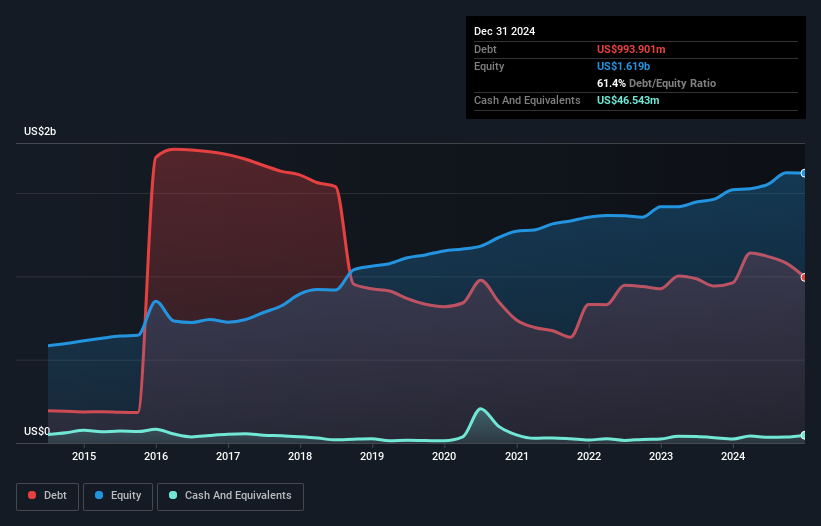These 4 Measures Indicate That Integer Holdings (NYSE:ITGR) Is Using Debt Reasonably Well
Legendary fund manager Li Lu (who Charlie Munger backed) once said, 'The biggest investment risk is not the volatility of prices, but whether you will suffer a permanent loss of capital.' So it might be obvious that you need to consider debt, when you think about how risky any given stock is, because too much debt can sink a company. We note that Integer Holdings Corporation (NYSE:ITGR) does have debt on its balance sheet. But the real question is whether this debt is making the company risky.
When Is Debt Dangerous?
Debt assists a business until the business has trouble paying it off, either with new capital or with free cash flow. Part and parcel of capitalism is the process of 'creative destruction' where failed businesses are mercilessly liquidated by their bankers. However, a more common (but still painful) scenario is that it has to raise new equity capital at a low price, thus permanently diluting shareholders. Of course, plenty of companies use debt to fund growth, without any negative consequences. When we think about a company's use of debt, we first look at cash and debt together.
What Is Integer Holdings's Debt?
The chart below, which you can click on for greater detail, shows that Integer Holdings had US$993.9m in debt in December 2024; about the same as the year before. On the flip side, it has US$46.5m in cash leading to net debt of about US$947.4m.

How Strong Is Integer Holdings' Balance Sheet?
According to the last reported balance sheet, Integer Holdings had liabilities of US$227.2m due within 12 months, and liabilities of US$1.23b due beyond 12 months. On the other hand, it had cash of US$46.5m and US$349.0m worth of receivables due within a year. So its liabilities total US$1.06b more than the combination of its cash and short-term receivables.
This deficit isn't so bad because Integer Holdings is worth US$4.06b, and thus could probably raise enough capital to shore up its balance sheet, if the need arose. But it's clear that we should definitely closely examine whether it can manage its debt without dilution.
View our latest analysis for Integer Holdings
In order to size up a company's debt relative to its earnings, we calculate its net debt divided by its earnings before interest, tax, depreciation, and amortization (EBITDA) and its earnings before interest and tax (EBIT) divided by its interest expense (its interest cover). This way, we consider both the absolute quantum of the debt, as well as the interest rates paid on it.
Integer Holdings's debt is 2.8 times its EBITDA, and its EBIT cover its interest expense 4.0 times over. Taken together this implies that, while we wouldn't want to see debt levels rise, we think it can handle its current leverage. On the other hand, Integer Holdings grew its EBIT by 25% in the last year. If sustained, this growth should make that debt evaporate like a scarce drinking water during an unnaturally hot summer. When analysing debt levels, the balance sheet is the obvious place to start. But it is future earnings, more than anything, that will determine Integer Holdings's ability to maintain a healthy balance sheet going forward. So if you want to see what the professionals think, you might find this free report on analyst profit forecasts to be interesting.
But our final consideration is also important, because a company cannot pay debt with paper profits; it needs cold hard cash. So the logical step is to look at the proportion of that EBIT that is matched by actual free cash flow. In the last three years, Integer Holdings's free cash flow amounted to 38% of its EBIT, less than we'd expect. That's not great, when it comes to paying down debt.
Our View
When it comes to the balance sheet, the standout positive for Integer Holdings was the fact that it seems able to grow its EBIT confidently. But the other factors we noted above weren't so encouraging. For example, its interest cover makes us a little nervous about its debt. We would also note that Medical Equipment industry companies like Integer Holdings commonly do use debt without problems. When we consider all the elements mentioned above, it seems to us that Integer Holdings is managing its debt quite well. Having said that, the load is sufficiently heavy that we would recommend any shareholders keep a close eye on it. When analysing debt levels, the balance sheet is the obvious place to start. But ultimately, every company can contain risks that exist outside of the balance sheet. For example - Integer Holdings has 1 warning sign we think you should be aware of.
At the end of the day, it's often better to focus on companies that are free from net debt. You can access our special list of such companies (all with a track record of profit growth). It's free.
Have feedback on this article? Concerned about the content? Get in touch with us directly. Alternatively, email editorial-team (at) simplywallst.com.
This article by Simply Wall St is general in nature. We provide commentary based on historical data and analyst forecasts only using an unbiased methodology and our articles are not intended to be financial advice. It does not constitute a recommendation to buy or sell any stock, and does not take account of your objectives, or your financial situation. We aim to bring you long-term focused analysis driven by fundamental data. Note that our analysis may not factor in the latest price-sensitive company announcements or qualitative material. Simply Wall St has no position in any stocks mentioned.
 Wall Street Journal
Wall Street Journal